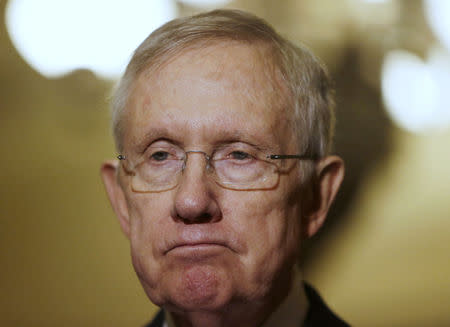U.S. spending bill likely to pass Senate, may take a few days
By Richard Cowan and David Lawder WASHINGTON (Reuters) - The U.S. Senate looked set to pass a $1.1 trillion spending bill but it might need a few days to overcome procedural hurdles before voting on legislation that averts a government shutdown and ends jitters over major budget standoffs until next fall. After the House of Representatives narrowly approved the bill late on Thursday following a battle that exposed fraying unity in President Barack Obama's Democratic Party, Senate Democratic leader Harry Reid hoped the bill would pass on Friday to spare Americans the drama of yet another budget crisis. Reid and Senate Republican leader Mitch McConnell labored to steer the massive spending bill toward passage late Friday but it was unclear whether they could get it done without delay. Any senator can hold up the vote. For example, Republican Ted Cruz, a fierce opponent of Obama's executive order offering relief from the threat of deportation to millions of undocumented immigrants, told reporters he wanted proceedings to include an up or down vote on funding the order. Cruz said he would use every tool available to bring about such a vote. However, while there could be some opposition to the spending measure from both the left flank of the Democrats and some Republicans, it appeared it would garner the votes needed to overcome procedural blocks. Procedural delays could bring a final vote Monday morning at the latest, according to aides. Lawmakers were making arrangements to extend temporary federal funds, now set to expire at midnight Saturday, until midnight Wednesday. That would give the Senate the time it needs to sweep away procedural roadblocks, pass the bill and ready it for Obama's signature. A revolt over financial provisions by House Democratic leader Nancy Pelosi, long a staunch Obama ally, led to a day of tension on Capitol Hill on Thursday. Democrats, aware of the need for unity when Republicans take full control of Congress next year after their midterm election gains, tried to tamp down speculation of a lasting split between Obama and Pelosi. One leadership aide said Pelosi had fired a warning shot to Republicans that House Democrats would fight hard in the new year. The House vote was delayed for seven hours after Democrats balked at provisions to roll back part of the Dodd-Frank financial reform law, an early legislative achievement of the Obama administration that was passed in response to the 2008 financial crisis and aimed to rein in risk-taking by Wall Street. Democrats also objected to a provision allowing bigger political donations. Reid urged quick passage of the bill, saying, "Since 2011 we have lurched from crisis to crisis with the country constantly under the threat of shutdown or financial catastrophe." McConnell is also anxious to avoid another unpopular government shutdown as the Republicans head toward taking control of the Senate after the November elections that also gave them a larger House majority. The 1,603-page bill, negotiated by Republican and Democratic appropriators and leaders, blindsided some Democrats and drew their ire when they discovered it would roll back a provision of the Dodd-Frank law due to go into effect next year. That provision would kill planned restrictions on derivatives trading by large banks, allowing them to continue trading swaps and futures in units that benefit from federal deposit insurance and Federal Reserve loans. PLAYING DOWN THE DIVIDE Democrats seeking to play down the Pelosi-Obama divide noted that the two actually were in agreement that the Dodd-Frank measure and some other Republican add-ons were objectionable, but differed on stopping the bill because of them. While Pelosi put up a spirited fight to kill the add-ons, she stopped short of trying to slay the spending bill late Thursday by demanding “no” votes by her Democrats. The battle was a warning to Republicans against further erosion of Dodd-Frank or the president's landmark healthcare law, said a House Democratic leadership aide. If such challenges arise next year, Pelosi said, "Should the president threaten a veto, the votes will be here in the House to sustain it." Democratic fervor against the Dodd-Frank provision was stirred up in part by Senator Elizabeth Warren, viewed as a possible 2016 presidential candidate. She repeatedly railed against it this week in Senate floor speeches that talked of Wall Street being allowed to "gamble with taxpayer money" and that caught fire with many House Democrats. In the 219-206 House vote, 67 Republicans rejected the spending bill, largely because it failed to take action to stop Obama's immigration order. But that was offset by 57 Democrats who voted in favor. If passed by the Senate, the spending bill would fund all government agencies through September 2015, except for the Department of Homeland Security, which would get an extension only through Feb. 27. That is the department mainly in charge of implementing the order announced by Obama last month. (Additional reporting by Susan Cornwell, writing by Frances Kerry; editing by Tom Brown)


